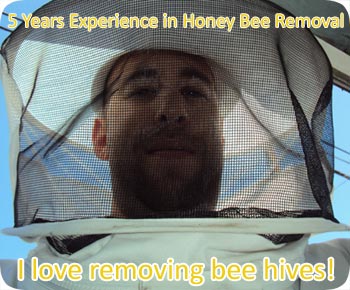
| Home Page | Anaheim | Long Beach | San Bernardino | Riverside | Photographs | Contact Us |
Anaheim Bee Removal
| Hello! My name
is Trevor, and I specialize in the removal of honey bee hives from homes
and other buildings. I am based in Anaheim, California, and
service most of southern CA, including LA, San Bernardino, Riverside, and south to Santa Ana and Huntington Beach. I operate a fully licensed and insured pest control business in the state of California. I have the best bee removal equipment and training available, and I have the best insurance and licensing available as well. I have a great advantage over the large pest control firms - first of all, I do better work than them, hands down. If you hire a big bug company, you'll get an underpaid employee who doesn't really care of the job is done right. If you hire me, I will arrive at your house, and do the job correctly and professionally, from start to finish. I have 5 years of bee removal experience, and I am available 24 hours a day, 7 days a week. Give me a call! |  |
 | Superior Bee Removal: We have trained for years specially on bee control and hive removal. Our experience counts a great deal when it comes to properly understanding the species of bee, and the type of hive that you are dealing with. My knowledge of architecture means that I am specially prepared to properly disassemble the area in order to remove the hive in its entirety, and fix the open area afterward. Bees can live in walls, roofs, attics, chimneys, soffits, under decks, and several other areas. They can even live as a swarm outside of a building, and each different area requires a different approach in order to get the job done right. I have been known to remove some hives as high as 60 feet off the ground! Not every bee removal company can do that. But more importantly, not every bee removal company is owner-operated, providing both the best level of service, and competitive rates, below that of the big companies and their unmotivated employees. Give me a call at 213-784-4944, and we'll schedule an appointment. |

Bee Control News Clip: Honey Bees in more trouble than ever after bad winter The mysterious 4-year-old crisis of disappearing Honey Bees is deepening. A quick federal survey indicates a heavy bee die-off this winter, while a new study shows Honey Bees' pollen and hives laden with pesticides. Two federal agencies along with regulators in California and Canada are scrambling to figure out what is behind this relatively recent threat, ordering new research on pesticides used in fields and orchards. Federal courts are even weighing in this month, ruling that the U.S. Environmental Protection Agency overlooked a requirement when allowing a pesticide on the market. And on Thursday, chemists at a scientific conference in San Francisco will tackle the issue of chemicals and dwindling Honey Bees in response to the new study. Scientists are concerned because of the vital role Honey Bees play in our food supply. About one-third of the human diet is from plants that require pollination from Bees, which means everything from apples to zucchini. Honey Bees have been declining over decades from various causes. But in 2006 a new concern, "colony collapse disorder," was blamed for large, inexplicable die-offs. The disorder, which causes adult Honey Bees to abandon their hives and fly off to die, is likely a combination of many causes, including parasites, viruses, bacteria, poor nutrition and pesticides, experts say. "It's just gotten so much worse in the past four years," said a research leader of the Department of Agriculture's Bee Research Laboratory in CA. "We're just not keeping Honey Bees alive that long." This year Honey Bees seem to be in bigger trouble than normal after a bad winter, according to an informal survey of commercial bee brokers cited in an internal USDA document. One-third of those surveyed had trouble finding enough hives to pollinate California's blossoming nut trees, which grow the bulk of the world's almonds. A more formal survey will be done in April. "There were a lot of beekeepers scrambling to fill their orders and that implies that mortality was high," Despite this, many Honey Bees continue to pose a problem when they form a hive inside human dwellings.